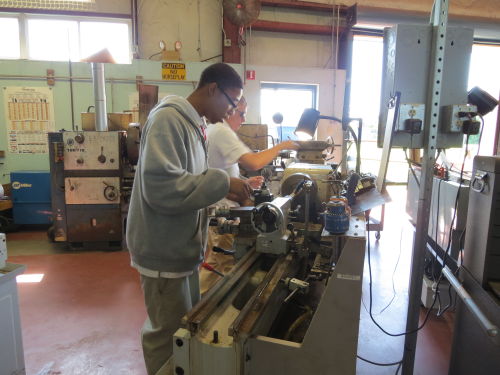
Gulf Island nears 30-year milestone
May 21, 2014
Graduates get jump on careers
May 21, 2014U.S. Sen. Mary Landrieu attained a position of local, statewide and national importance amid her contentious re-election campaign, but the Democrat’s opponents have branded her elevation to chairwoman of the Senate Committee on Energy and Natural Resources with cynicism.
It took Louisiana’s senior senator 17 years to earn the gavel of a coveted committee central to debates over high-profile issues like offshore drilling, inland fracking, alternative energy and greenhouse gas emissions, all of which affect Louisiana jobs and residents. Whether her power to summon hearings and set the energy agenda benefits Louisianans or serves more as a personal pulpit, however, has become a campaign issue with local implications.
Brian Brox, an associate professor at Tulane University who teaches courses on American government, elections and voting behavior, said the Chair’s importance could not be overstated in terms of what it means for voters and for the senator’s fundraising efforts. Still, it’s one issue of many that voters will consider at the polls.
“I can’t emphasize enough the importance of being a chairperson in one of these congressional committees – they really have a significant amount of influence,” over the committee agenda and specific bill contents, Brox said. “Clearly, being the chairperson of this committee puts her in a very important position to advance legislation that would be favorable to the jobs and to the businesses of this state, to prevent legislation that would actually be harmful.”
Congressman Bill Cassidy, R-Baton Rouge, is seen as Landrieu’s biggest threat. John Cummins, the campaign’s communications director, labeled Landrieu’s chairwomanship as self-defeating, rationalizing that a majority-Democrat Senate could stymy any pro-energy, pro-Louisiana legislation she would push.
“Sen. Landrieu’s public-relations machine is very good about talking about how vital her role is to Louisiana’s energy economy, but so far it’s really only been vital to promoting herself,” Cummins said.
Landrieu’s camp contends her track record on energy-related issues should stand as proof she can navigate legislation beneficial to Louisiana to bipartisan enactment. Her supporters also point out that the oil-and-gas industry has indicated its confidence in her via campaign contributions.
“Louisiana holding the Senate Energy Committee gavel means the 300,000 individuals whose jobs are directly connected to the oil and gas industry have a champion at the head of the table to push robust domestic energy production and job creation,” Landrieu said in an emailed statement. “It means more high-paying jobs that allow middle class families to buy homes, build wealth and achieve the American Dream. And it means that our middle class families can continue to live along America’s working coast —where families have access to affordable flood insurance, communities are protected from storms and our wetlands are restored and vibrant.”
The bi-polar Congress has been plagued by gridlock under President Barack Obama’s presidency, as the Republican House and Democratic Senate have been unable to strike accord on many important issues. Having a Democrat who agrees with the at-large House energy priorities chair the Senate committee could provide a valve to release some of the constipation, Brox intimated.
Cassidy’s team points to the latest Keystone Pipeline development as an indicator Landrieu doesn’t wield the power she claims. Landrieu has urged the administration to grant the project approval since at least 2011, though she approached it with renewed vigor earlier this month, launching an aggressive campaign to land an up-or-down vote that was ultimately thwarted by Senate leadership.
“As we saw after Harry Reid canceled the Keystone vote, Sen. Landrieu said all she can do is try,” Cummins said. “I don’t think Louisiana wants just talk anymore; Louisiana wants problems solved.”
Ultimately, Keystone’s fate will likely be used to assess Landrieu’s energy-related power, Brox said.
“Landrieu has been an outspoken proponent of (Keystone), and I think it will be an indirect indicator of how powerful she might be,” Brox said.
Landrieu’s opponents have also said the Democrat will use Energy Chair to aid her wealthy business-owning allies, twisting the screw of ordinary partisan rhetoric after Lockport-based Bollinger Shipyards’ president, chairman and CEO Donald “Boysie” Bollinger, an active member of the state’s GOP, endorsed Landrieu in a television advertisement. In the campaign ad, Bollinger labeled the committee chairmanship “the most powerful position a person can have for Louisiana.
“I have over 3,000 employees, and even though I’m a Republican and don’t always agree with her, Louisiana can’t afford to lose Mary Landrieu,” said Bollinger, a three-time finance chairman of the state’s Republican Party and delegate to the national party. “It means more boats, more jobs and more oil and gas.”
Bollinger, as well as the rest of the company’s executive committee, declined to answer related questions posed via a company spokesman.
Bollinger Shipyards has constructed more than 130 vessels for the U.S. Coast Guard, winning the rights to the work through a competitive bid process overseen by the federal government. Landrieu, as chair of the Senate Homeland Security Appropriations Subcommittee, helped free up federal dollars to commission the work.
Boysie Bollinger has contributed $5,000 in the current cycle to the campaign to re-elect Sen. Mary Landrieu, filings with the Federal Elections Commission show. In the 2012 cycle he contributed $3,400 to Cassidy’s congressional campaign.
Should Republicans claim the Senate majority, Lisa Murkowski, R-Alaska and Industry-Friendly, would likely rise to the Energy chair. The race for chamber supremacy could come down to one seat, and quite possibly Landrieu’s, further layering the electoral enigma.
Houma-Thibodaux’s humming economy is inextricably linked to the maritime and oil-and-gas industries. The MSA boasts the lowest unemployment rate in the nation now that energy-related activity in the Gulf of Mexico’s Outer Continental Shelf has eclipsed levels prior to the fatal and environmentally disastrous BP Deepwater Horizon blowout.
Last year the industries were represented by nine of the Lafourche’s top-10 taxpayers, who contributed a combined $20.2 million to local services like public education, law enforcement, drainage works and recreation. Their combined tax bill equated to 17.9 percent of the $112.5 million owed by all residents and businesses in the parish last year.
In Terrebonne, nine of the top 10 and 16 of the top 20 taxpayers last year were related to oil and gas or marine industrial. The 16 companies combined to pay $19.8 million in local ad valorem taxes, or 23.5 percent of Terrebonne’s property tax roll.
Landrieu has performed fairly well in the energy-dominated corridor in past elections, taking 49.1 percent of the Lafourche vote and 47.6 percent of the Terrebonne vote in 2008, almost doubling President Barack Obama’s collection of 25.5 percent and 28.5 percent, respectively.
What impact will her new position have on the election?
“For lack of a better term, I think (Energy chair) will play a moderate role,” Brox said. “It’s really going to boil down to what Louisiana voters care about in their elected representative.”
Bollinger Shipyards CEO Donald “Boysie” Bollinger appears in a campaign advertisement promoting Sen. Mary Landrieu’s re-election. Landrieu’s newfound gavel on the Senate Committee on Energy and Natural Resources has become a campaign issue, with her opponents saying the power she claims to wield is overblown.










